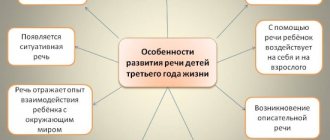: Reading time:
Parents often complain about their children:
“I tell him: “Get your toys.” He plays as he played. I told him again: “It’s late, it’s time to collect the toys.” At best he nods. And more often he doesn’t react at all - he continues to play and that’s it.”
“I can ask my daughter for something ten times, but until I shout at you, you won’t get anything from her.”
“Until I scream, no one will even look at me. Sometimes it seems to me that they are deliberately taking me out.”
I don’t want to scream or swear. It is much more pleasant to be a kind, calm parent. But what to do when you said it once, said it twice and made no sense? Let's first figure out what exactly you shouldn't do. So, the child does not respond to comments.
Rule 1. Equilibrium
Any appeal to a child must have balance. Let's divide our appeal into two parts, and both parts should be approximately equal.
Equilibria of prohibitions and permissions
The more demands on a child, the more respect for him. An older preschooler can already take on a number of responsibilities and be responsible for their implementation, just as he can do a lot without asking adults. Rules will help you achieve balance here.
It is the Rules that an adult sets that give restrictions and permissions:
— you can take your toys at any time if you put them away yourself;
- you can invite a friend over if you clean your room yourself;
- You can take apples without asking if you wash them first.
Please note that we are not saying you shouldn't eat dirty apples. We expand the child’s zone of independence and establish prohibitions using rules. Rules are the basis for the balance of prohibitions and permissions.
Factors leading to hearing loss
Hearing can be impaired due to many factors. The following factors can cause hearing loss in children:
- infectious diseases suffered by a pregnant woman during pregnancy (measles, rubella, influenza);
- genetic predisposition;
- uncontrolled use by the expectant mother of antibacterial drugs and other medications contraindicated during pregnancy;
- fetal hypoxia;
- premature birth;
- injuries received by the baby during childbirth;
- sulfur plugs located in the ear canal and interfering with normal sound conduction;
- foreign object in the ear: children often unsuccessfully “experiment” with their bodies and stick foreign objects into their ears (parts from toys, construction sets, beads);
- The cause of hearing loss in a child may be an infectious disease, for example, otitis media or rhinitis; in this case, the child’s hearing deteriorates temporarily; as a rule, the unpleasant symptom goes away after complete recovery;
- the cause of hearing loss can be a traumatic brain injury, and hearing loss may not develop immediately, but after a certain time after the injury;
- diseases of the upper respiratory tract (rhinitis, enlarged adenoids);
- a decrease in sound perception can result in such serious infectious diseases as scarlet fever or measles;
- injuries to the outer ear, for example, when inserting a toothpick or any other sharp object into it;
- taking ototoxic drugs can also result in a decrease in the level of auditory perception;
- loud sounds can lead to acoustic trauma and, in turn, provoke hearing loss;
- Listening to loud music on headphones can result in rapid hearing loss over time.
A child, with limited hearing, may not always understand that he has a problem, so parents need to be very careful and when the first alarm bells appear, they should immediately have the child examined by an ENT doctor.
Friends! Timely and correct treatment will ensure you a speedy recovery!
Rule 2. No offense
The interaction process does not always go smoothly. It can be difficult for a child to learn new rules, come to terms with restrictions and prohibitions, and take responsibility. Naturally, the child will try to circumvent restrictions and rules and break prohibitions.
And adults are far from ideal: unfulfilled promises, uncontrolled emotions, unfair remarks, inflated demands. These situations are necessarily accompanied by childhood grievances and conflicts.
Resentment tends to accumulate. There are no small grievances. A small resentment remains in the child’s soul, never disappearing. The next offense is superimposed on the previous one. In psychology, this phenomenon is called the “Snowball”. Its essence is that misunderstanding between adults and children is layered and one day will definitely fall apart, destroying the mutual understanding between the adult and the child. And if such a lump does not fall apart, it can reach enormous sizes and build a wall between adults and children.
How to deal with a naughty teenager?
Teenagers have a more developed sense of self-identity. The way they perceive themselves determines their view of their place and importance in the world. This forms the basis of values and beliefs that guide their behavior. They better understand the rules and expectations that society places on them. However, it is important to understand that adolescents are constantly “testing” their degree of independence and control in the context of these boundaries.
The behavior of a teenager depends on three factors: personality, degree of excitability and the amount of accumulated stress. Young people are less likely to take risks, but their behavior often seems more challenging. But, more often than not, this happens unintentionally. They just need clear boundaries within which they will develop and mature.
If a teenage child does not feel support, respect and recognition in the family, he will look for it elsewhere. In addition, without the participation of family members in his life, a teenager becomes aggressive and depressed.
Rule 3. Acceptance
Your child is a unique individual. There is no other like it, and there never will be. The uniqueness of the baby consists of physical characteristics and mental characteristics. Everything that is in it is based on the heredity that the child inherited from his parents.
It is clear that nature sometimes creates combinations that we do not always like. A child does not consist entirely of our strengths alone; alas, he also collects our shortcomings.
By accepting our child, we accept ourselves. Therefore, do not look for disadvantages in children's behavior and appearance, but accept the uniqueness of your child as your own. Do not deceive your child with false characteristics, do not look for those to blame for his failures. Accept it entirely and learn to live, solving your problems and developing your abilities.
—Are you afraid to perform on stage? It happens, I was scared too as a child, we will practice and it will pass.
“When I was a child, I also had difficulty coping with the stress of physical education, but I took up sports and it became easy!” I suggest starting to exercise right now.
Of course, accepting a child means loving him not because he is beautiful, smart, capable, and so on, but simply because he is!
Unexpected repetitions
Children grow up, but the rules don't change. Repeat what you agreed on before, using the same methods, but in different situations, from a different angle, under different conditions and in a different emotional environment from the previous ones.
The wishes of the parents will definitely be heard and will remain with the child forever.
Life will throw up many difficult questions, but subconsciously people will look for answers to them, remembering what their parents once told them.
Why doesn't your child listen to you?
Often, for no apparent reason, your child begins to be capricious and do everything contrary.
What is the reason? The answer to this question will help you find out a new test from I am a Parent Take the test
Rule 4. Call your child by name
Do you remember how long and carefully you chose a name for your child? A name is the most pleasant melody for any person, as Carnegie rightly said.
However, modern parents often replace the name with harmless nicknames: bunny, honey, princess, etc. Of course, they have the right to “live” in everyday communication as a playful moment, but do not carry any personal burden.
A name is the personality of a person, even if he is still very small. A person hears his name from birth. Close people call the baby's name tenderly, affectionately, with love. The baby, not understanding the words, catches love in the sound of the name. Accepting love along with a name stays with a person forever!
By calling a child by name, we emphasize that we are interested in him and his opinion, and not in something impersonal. By playing with name options, we can calm the baby down, set him in a serious mood, and emphasize his importance.
- Mashenka, are you offended?
- Masha, are you going to kindergarten?
— How will your performance be announced at the festival? “Speaking: Maria Ivanova.”
— What does Maria Alekseevna think about this issue?
Each appeal has its own emotional connotation, which the child unmistakably picks up.
Psychologist Tatyana Cherneva: What to do if the child does not hear the first time?
Almost every parent faces the problem of repeatedly repeating their requests to their child. “Go eat,” and the child continues to play enthusiastically.
“Go eat,” mom repeats, and the sound of her voice becomes louder.
“Don’t you hear, I’ve already told you 100 times,” she laments, losing her composure.
So why doesn’t the child “hear”, or rather even “listen” to you?! What is the cause of the problem and how to solve it, let's figure it out.
Imagine that you are cleaning your apartment, and suddenly a growl is heard outside the window. You stop cleaning, go to the window, and study the source of the sound. Seeing that the workers are trimming the trees, you return to your household chores. The sound outside the window no longer distracts your attention; you realized that for some time it will disturb the silence, and soon you will not notice it.
Now let's return to the child. How often do we say something to him, but our words do not carry tangible consequences? If this happens often in your home, then the child begins to treat your words the way you treat the trees being pruned outside the window. Such a model is being laid, unfortunately, very early! And when we already want the child to fulfill our requests, it manages to become firmly entrenched in his perception. Then we naturally begin to first become irritated, then angry, then shake the air with reproaches, but again, behind all this “noise” the child does not understand the essence of the situation! When and how do we make mistakes? While the child is very small, just starting to walk, we tell him, for example, “Give mom a toy!”, but his attention has already flown to a flock of cheerful sparrows, and mom takes the toy herself. What was worth doing? Yes, just draw attention to the toy again! Even if you took it, then by giving it into the children’s hands of someone interested in this whole situation, you are already making your words meaningful, associated with the action, and not abstract “white noise” in the background.
If such a model has already formed in your child, do not despair. The problem can be solved, although not immediately. Initially, your attempt to give weight and meaning to words through action will cause a childish protest. The child hopes to leave everything as it is and will look for a loophole. But, if you can be consistent in your steps, everything will work out!
Here are a few rules you can follow to correct the situation:
Rule 1. “Eye contact”
In young children, the brain can concentrate on solving only one problem. If your baby is engrossed in a game and you call him for dinner, don’t be annoyed that she can’t hear you, he’s not capable of it. Before voicing your request, it is IMPORTANT to establish eye contact with the child and turn his attention to you. Your eyes should be at the child’s eye level; it’s even better to take his hand. Address him by name: “Sasha, look at me,” “Lena, listen to what I say,” etc. It is useful to ask a child over 3.5 years old to repeat what he heard. The tasks you assign to yourself are much more enjoyable to complete.
Rule 2. “One task”
Children cannot always track the sequence of parental requests. “Take a glass, put it in the sink, and then wipe the table or undress, wash your hands and go eat.” Children cannot remember the entire algorithm of actions and get stuck at some stage. Break complex tasks into simple ones. Voice one task to your child: “Take the glass away,” and if it is completed, move on to the next request.
Rule 3. “Speak in understandable language”
Until the age of 7, children do not possess abstract thinking. And if in their dialogues parents use phrases like: “How long will it take you to count crows?”, then the small child does not understand that in this phrase his mother encourages him to action. Speak in a language that is understandable and native to the child, so that he can understand you.
Rule 4. “Here and now”
“Sasha, how many times can I tell you, don’t go near your older brother, don’t take his construction set! You’ve already forgotten how he bloodied your nose, do you want to get it from him again?.. etc.”
It is clear that the parent is, as they say, “boiled” and wants to somehow stop the child’s dangerous behavior. But listening to a long notation, the baby only gets confused in the words and forgets what they are actually talking about. You should not remind your child of “past” sins. There is no need to be frightened by future troubles. So, by the way, you form catastrophic thinking in a little person. Children live “here and now,” so trying to influence him with long explanations is pointless. It is best to say briefly at such a moment: “You cannot destroy your brother’s buildings.” After this, switch the baby’s attention, play hide and seek with him, catch up, and invite him to compete to see who can better jump over the pieces of paper laid out on the carpet. In a word, find a safer outlet for the energy that overwhelms the baby. And the most important rule is that if you cannot change the child’s behavior, change the circumstances that provoke dangerous behavior. For example, allocate a special space for your older child to play, where no one will disturb him.
Rule 5. “Be consistent”
Don't yell at your children; you don't cause anything in him other than fear, anxiety, bad mood, anger and resentment. He is accustomed to your requests as to the sound background outside the window. And after your own emotional outbursts, most likely, you will only be overcome by guilt and shame for your “immature” behavior.
The best way to keep your emotions under control is to be consistent. If a child understands that there is no way to beg sitting in front of the TV for an hour, he will stop ignoring the request to turn off the cartoons.
Rule 6. “Warn in advance”
Children perceive what is said not as quickly as adults, but with a delay of several seconds. Including because voluntary attention (that is, the ability, through an effort of will, to be distracted from what is interesting in favor of what is necessary) is fully formed in a child only by the age of 6–7 years. This means that a child under six cannot quickly switch from what is interesting to him (for example, moving stools across the floor) to what is “interesting” to you (getting dressed and going to the clinic). Give your baby a “temporary” supply. Agree with him how many times he can slide down the slide before going home, then your request will probably be heard. Option: if your son “doesn’t hear” that it’s time to leave the cars and go to lunch, invite the cars to compete - who can get to the kitchen faster, etc.
Rule 7. “Remind in advance”
Children have a very developed visual memory, so reminder pictures work very effectively to master routine moments. For example, at one and a half to two years of age, a baby is already able to learn that he needs to wash his hands in three cases: before eating, after going to the potty, and after a walk. Hang bright pictures in the bathroom and hallway dedicated to these three situations. The child will readily mark each hand washing with a bright circle or cross.”
Rule 8. “Induce the desired action”
Our brain is structured in a very interesting way; it grasps what it hears and immediately prompts this action, while the particle “not” is inaudible for a child. “Don’t walk in the puddle!” sounds like a tempting offer to try its depth. Offer an interesting alternative. For example: “Let's try to get around the puddle along this narrow curb.”
Rule 9. “Don’t pull back”
How many times have I heard how restless mothers correct their child every now and then. “Stop, there’s a dog”, “Don’t fall”, “Don’t get dirty” - and so on all day long. At some point, the child, tired of the pressure, begins to perceive his mother’s speech simply as a “background.” Try to count how many times during a walk you make comments to your child. Which of these comments could very well not be made? Don’t pull him down for any reason, but try to be there when the baby is active. Climb the hill with him, go for a group of friends to see what is lying there in the bushes, look at the dog together. The baby will definitely “copy” your safe behavior.
So: no need for negativity! Switch, interest, motivate the child, but! AND REMEMBER, WORDS MUST BE SUPPORTED BY ACTION! It is then that they acquire meaning and meaning.
Photo: ppms.edu-penza.ru
Useful tips
We looked at what needs to be done if a child does not listen in typical situations. However, there are general recommendations that will be useful to all parents. And it doesn’t matter how old the child is - 3, 5, 8 or 9 years old.
- Reduce the number of prohibitions, leaving them for really serious situations. In this case, the number of punishments will immediately decrease.
- If an 8-year-old child does not listen, and you are used to solving problems by shouting, try to calm down and make comments in a calm tone.
- If your child does not listen because he is engrossed, try to attract his attention not by shouting, but, on the contrary, by whispering, facial expressions or gestures. The interlocutor will have to listen, willy-nilly.
- Don't voice your demands over and over again. First, simply warn the child to stop playing around, then a disciplinary measure follows. And after the punishment, the reason for such strict measures is explained.
- Try not to use the particle “NOT” in your speech. This advice is based on the idea that children do not perceive a negative particle, literally taking the request as a guide to action.
- If children are hysterical, there is no need to appeal to their reason at this moment. Calm down yourself, confirm your demand again without raising your voice. This happens more at 8 or 9 years old, but with young children a distraction maneuver will work.
- Be consistent in your actions, demands and promises. Also enlist the support of your spouse and grandparents. Consistency will not allow you to disorient the child, who will have no reason to behave provocatively.
- Try to spend more time communicating with your children. Moreover, it is not the number of minutes that is important, but the quality of interaction.
- Prepare yourself mentally for the inevitable growing up. The child grows, he needs more independence to realize his desires and plans. Ensure this independence whenever possible.
- Show genuine interest. Find out what your grown-up child is doing. Perhaps his favorite films are not so superficial, and the music is quite melodic.
Find out how to properly punish a child from an article by a child psychologist. It also describes constructive methods of punishment.
If a child at 10 years old or 2 years old does not listen after many months of effort on your part, it is better to consult a psychologist.








